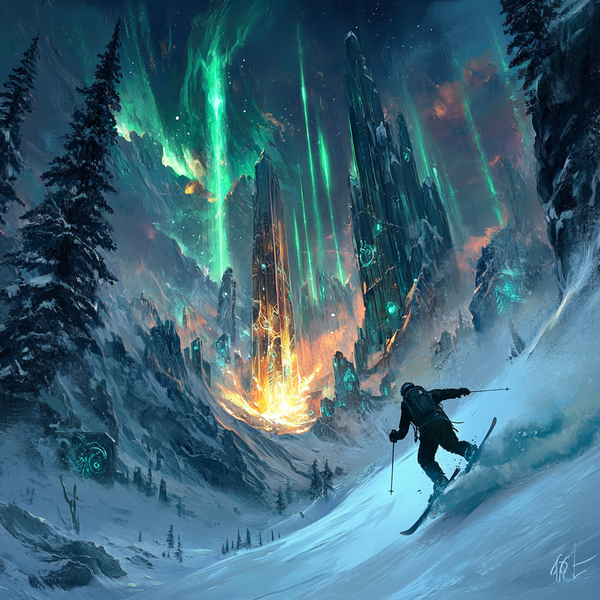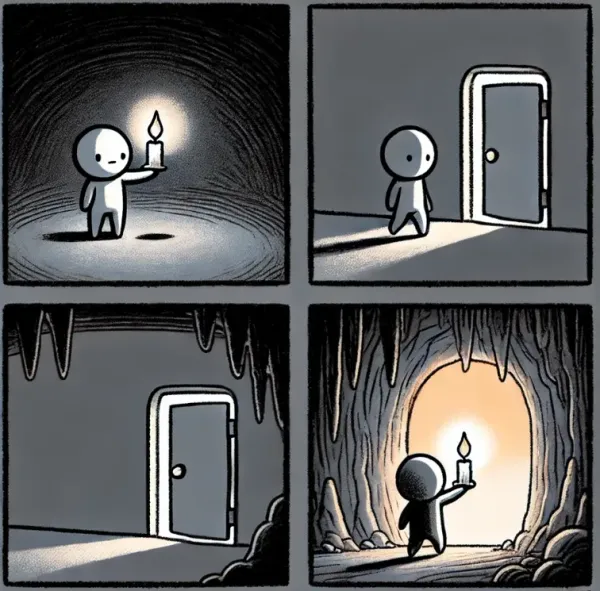Four Questions to Find "The Force"
When sci-fi is more science than fiction.
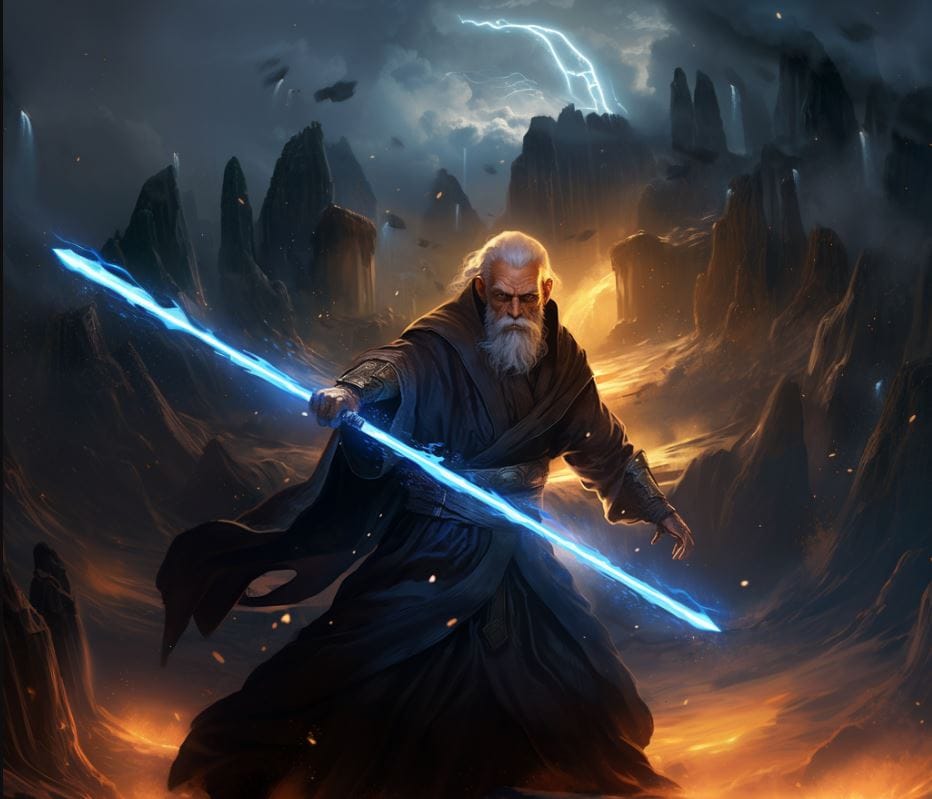
[5 minute read]
The Force is what gives a Jedi his power. It's an energy field created by all living things. It surrounds us and penetrates us. It binds the galaxy together.
-Obi Wan Kenobi
This article isn’t going to work without your full participation. I am going to pose four practical questions. Each time, I’d love you to put your phone down for at least thirty seconds and reflect on the answer, I’ll still be here when you get back.
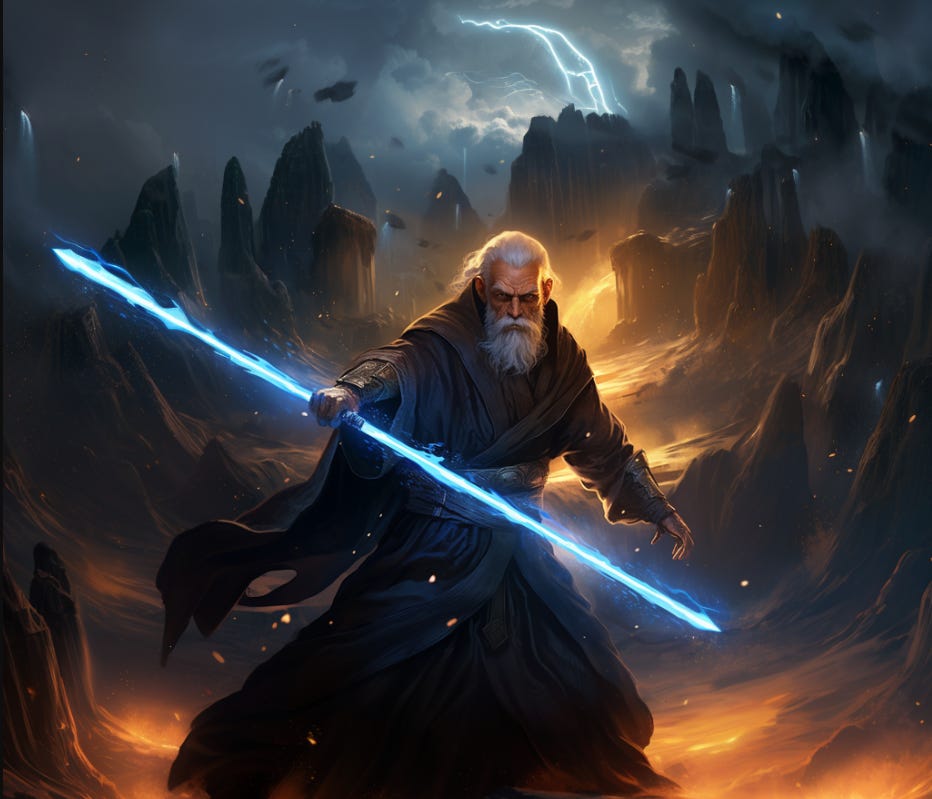
#1 What can you most easily pay attention to?
When freed of distractions, what can you spend a virtually unlimited amount of time focused on? What topics feel meaningful and leave you energized afterwards? The more specific to you, the better.
Take a moment to consider your response.
One way to help answer each of these questions is to consider their opposites. It’s probably much easier to identify the things you absolutely cannot pay attention to, no matter how hard you try.
Our gifts are often on the other side of our curse. To give you a tangible example, exploring this question with my wife has actually improved our marriage. I spend a lot of time up in my head thinking about abstract ideas. And when I say a lot, I mean most of my waking hours. When I explore and share meaningful concepts it gives my life purpose. But this constant thinking sometimes prevents me from anticipating my family’s needs as much as I should. When my wife realised I’m not being deliberately inconsiderate, just accidentally, it has helped her be more compassionate.
#2 How do you turn this attention into an action?
Maybe it’s writing and speaking about your passions, maybe it’s creating a physical object, maybe it’s interacting with other people. The passage of time is once again a great indicator; the more you’re in flow, the better.
Take some time to reflect.
Once again, it’s probably easier to consider the kinds of actions we dislike, or find incredibly difficult to pay attention to. Avoid activities where time drags.
#3 How would you integrate this action into the world?
This might be the hardest question you’ll ever ask. “Where does my unique gift meet what the world needs?” It’s now something of a cliché, but the Japanese concept of Ikigai is a very helpful framing.
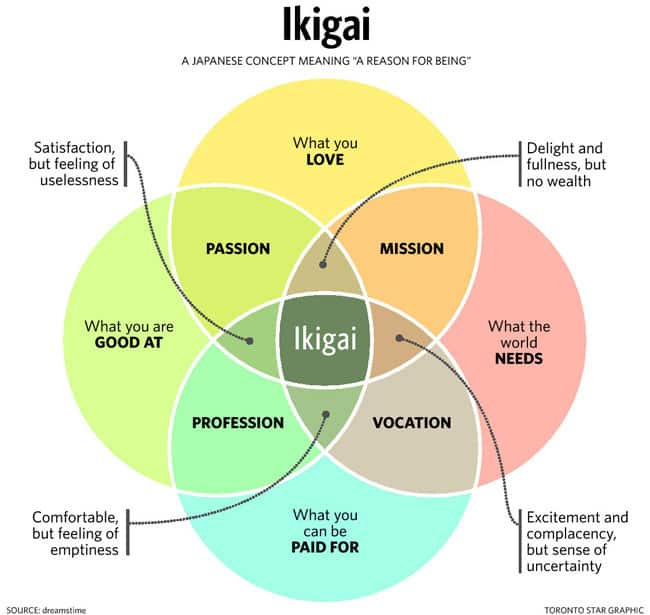
We all wish we could be paid to do what we love. But it’s a frustratingly open question as to how much our current world rewards us for manifesting our unique gifts. As my friend put it to me recently “does the universe care about my wallet?”
There is at least a tidy logic. Once you have presented the results of your creative act to the world, you might receive a response. Sometimes it’s unambiguously obvious, like money or recognition. But my suspicion is the single best indicator is synchronicities, meaningful coincidences. These are a little wink back from the world that you’re pursuing the correct path. You probably can’t know for sure what the world needs until it shows you if you’re right.
And again- it’s substantially easier to know when what you’re doing serves no greater purpose. It feels meaningless.
#4 What’s “The Force?”
This is the single most interesting question I am considering right now. What is relatively well proven by science, but hasn’t been fully integrated into our collective worldview?
I think the answer is something close to what systems theorist Ervin Laszlo calls the “holotropic attractor” (explained in an incredibly succinct article below).
The attractor that biases interactions in the universe is wholeness-oriented: it is a “holotropic attractor.” It need not be a separate, additional law of nature: it could be, and most plausibly is, the emergent effect of the known laws.
The holotropic attractor appears as a tropism toward coherence and oneness throughout nature. In the human realm, it comes across as instinct and intuition, or subtle spiritual insight. It connects people with nature and the universe. It is effective whether we are aware of it or not. But it is more effective when we are aware of it, because then we can be consciously connected and guided by it.
There is a force that pulls us towards wholeness and integration. We experience it through subtle intuition and a sense of “meaning” when we’re pursuing it.
Laszlo half-jokingly likens this to “the force” from Star Wars. That connection is a lot less absurd than it may seem when you consider that Joseph Campbell’s monomyth was a significant influence on George Lucas. And the monomyth precisely describes the process of integrating your life with this force. “Stories” resonate in direct proportion to the importance of the evolutionary information they encode. It’s why Star Wars remains so culturally relevant despite having been released nearly half a century ago.
The answers to the first three questions may help you integrate the force into your life.
First you use a sense of “attraction” to identify your direction, then you find an action to move along that path. Synchronicities are an indication if you’re going the right way. It’s substantially less mystical when you consider that evolution would need some kind of mechanism to signal when we’re pursuing an optimal direction. There’s a beautiful idea that the passage of time is such an important indicator because it tells you when you’re flowing at the same speed as evolution.
The Star Wars version of the force is obviously associated with the awakening of psychic abilities. While that may not be as far-fetched as I initially would have thought, it seems like the primary benefit is simply being able to harmonize with evolution’s unfolding flow.
As with all the other questions, it’s worth pondering why this force hasn’t been integrated, either into your life, or our scientific paradigm. What has stopped you from following your curiosity? It’s probably the very real limitations of our zero-sum economy. But it might also be our personal fears and traumas. Is it something within you that denies the very existence of this robustly-proven force? Or is it the grasping fear of a cognitively limited mind that doesn’t want to surrender control?
When the mask of Darth Vader is removed, you see an unformed man, one who has not developed as a human individual. What you see is a strange and pitiful sort of undifferentiated face.
Darth Vader has not developed his humanity. He's a robot. He's a bureaucrat, living not in terms of himself but of an imposed system. This is the threat to our lives that we all face today. Is the system going to flatten you out and deny you your humanity, or are you going to be able to make use of the system to the attainment of human purposes?
-Joseph Campbell
Related reading & listening.
- Listen. Talking Billions: Tom Morgan: The Curiosity Sherpa to Billionaires with Bogumil Baranowski (1 hour 32 minute listen).
- Why listen. This is one of my favourite podcast conversations. I was lucky to be invited to explore the complexity theory of curiosity. Bogumil has the world’s most relaxing voice and was stunningly well prepared for our chat.
Read. Evolution - ‘The Force’ That Is With Us by Ervin Lazlo (7 minute read)
Why read. I personally need science to support my spiritual intuitions. And Laszlo’s work does precisely that.
The conclusion is inescapable. There is a force in the universe — a tropism or attractor — that biases no-longer random interactions toward forming complex entities — entities that are whole, and are coherent enough to maintain themselves and evolve to higher levels of coherence and complexity.
Read. 15 Ideas, Frameworks, and Lessons from 15 Years by Corey Hoffstein (40 minute read).
Why Read. Somewhat away from today’s topic, but no less valuable. I find Corey to be one of the most engaging minds in markets. This piece offers a lot of great insights on the nature of risk, portfolio construction and modern investing and trading. His final lesson incorporates the central premise of open-mindedness, my general obsession, and an essential trait in investors:
“This final lesson is about a mental switch for me. Instead of seeing something and immediately saying, “the market is wrong,” I begin with the assumption that the market is right and I’m the one who is missing something. This forces me to develop a list of potential reasons I might be missing or overlooking and exhaust those explanations before I can build my confidence that the market is, indeed, wrong.”

